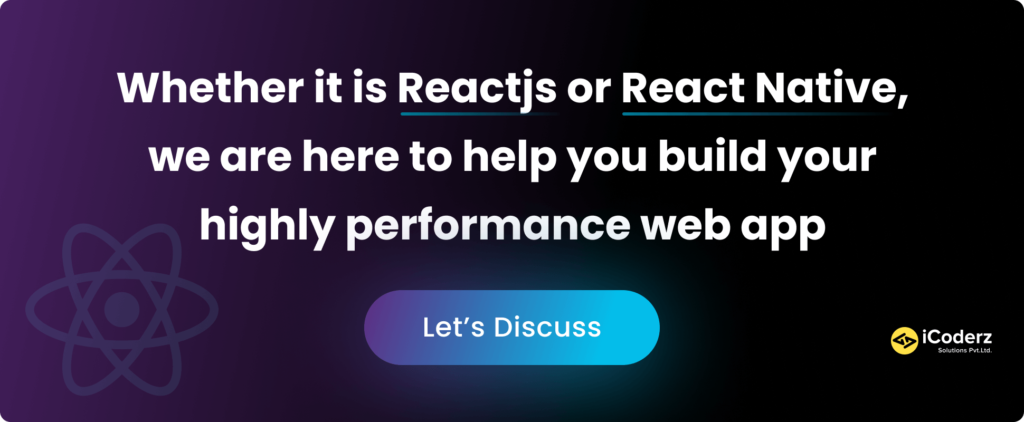Table of Contents
ReactJS and React Native are both JavaScript-based UI and mobile app frameworks, but there is a key difference between them. React Native lets you build faster cross-platform apps by calling native APIs directly from JavaScript, while ReactJS does not. Find out in this article how the two compare to each other and which one is better for your project.
ReactJS vs React Native both offer the heavy lifting needed for mobile app and web development. The only real difference lies in the functionality each provides.
React Native vs ReactJS have become two of the most popular web development technologies in the world. However, it can be difficult to see the differences between them unless you’re looking at extremely popular sites. This isn’t surprising when you consider that these two technologies are utilized by some of the most well-known websites and mobile applications.
ReactJS and React Native are both competing options in the world of Mobile App Development. However, even the most seasoned developers can be unclear on the details of this argument.
What is ReactJS?
ReactJS is a JavaScript library that was created by Facebook. It’s used for building user interfaces and can be used with a variety of programming languages. ReactJS is a popular choice for front-end development because it makes creating interactive UIs easy.
React Native, on the other hand, is a mobile application framework that was created by Facebook. It’s used for building native Android App Development and iOS applications using ReactJS. React Native lets you reuse your existing React knowledge and skills to build native mobile apps.
So, what’s the key difference between ReactJS and React Native? ReactJS is used for developing web applications while React Native is used for developing mobile apps. Let’s take a closer look at the advantages and disadvantages of each technology to help you decide which one is right for your project.
➡️ Also Read: 10 Best JavaScript Frameworks to Choose in 2023
Advantages of ReactJS:
1. ReactJS is a JavaScript library for building user interfaces and web applications.
2. It is declarative, efficient, and flexible.
3. It makes use of the virtual DOM which is a JavaScript object that represents the structure of a document. This makes it easy to update the UI without having to reload the page.
4. ReactJS is easy to learn and has a small API surface area.

Disadvantage of ReactJS
ReactJS was created by Facebook and is used by several companies, including Instagram, Airbnb, and Netflix.
While ReactJS has several advantages, it also has some disadvantages. One disadvantage is that it can be hard to learn. This is because React uses a different approach than traditional HTML to build user interfaces. Another disadvantage of ReactJS is that ReactJS can be slow when rendering large amounts of data.
ReactJS also has some potential security risks. One risk is that it uses a virtual DOM, which can allow malicious JavaScript to execute. Another risk is that ReactJS allows developers to use inline JavaScript, which can be used to attack the user’s browser.
Business Benefits of Using ReactJS
There are several benefits that businesses can enjoy by using ReactJS. Perhaps the Biggest Benefit of ReactJS is that ReactJS can help improve the performance of web applications. This is because ReactJS uses a virtual DOM, which means that it only updates the parts of the DOM that have changed, rather than re-rendering the entire DOM every time there is a change. This can lead to significant performance gains, particularly on large and complex web applications.
Another important benefit for businesses is that ReactJS is easy to learn and use. It has a small API and a simple syntax, which can make it much easier for Hiring ReactJS Developers to get up to speed compared to other frameworks such as AngularJS vs ReactJS. This can lead to reduced development costs and faster time-to-market for new web applications.
Finally, ReactJS is also highly scalable. This means that it can be used to develop large-scale web applications without any problems. Many of the largest websites in the world, such as Facebook and Netflix, are built using ReactJS.
What is React Native?
React Native is one of the most popular frameworks for mobile development and is used by some of the largest companies in the world, such as Facebook, Instagram, and Airbnb.
React Native is based on the React JavaScript library, and so shares many of its core features. One of React Native’s key advantages over other mobile development frameworks is its ability to leverage the native capabilities of each platform it runs on. This means that React Native apps can have a truly native feel, while still being cross-platform.
Another advantage of React Native is its flexibility. Because it is based on JavaScript, it can be easily integrated with other technologies and frameworks. This makes it easy to create hybrid applications that combine the best of both worlds – native performance with web-based flexibility.
One downside is that because it uses native components, it can be difficult to achieve a consistent look and feel across different platforms. Another potential issue is that not all native capabilities are available on all platforms – so you may need to do some extra work to get your app working perfectly on every device you want to support.
✅ Looking to Hire JavaScript Developers?
Advantages of React Native
There are many advantages of using React Native over other frameworks when developing mobile applications. Some of these advantages include:
• Increased Performance – React Native App Development are generally faster and more responsive than those developed using other frameworks. This is because React Native uses native components instead of web components, which results in better performance.
• Reduced Development Time – Since React Native uses JavaScript, it can be used to develop both iOS App Development and Android apps. This means that you don’t need to Hire a Separate App Developers for each platform, which can save you a lot of time and money.
• Easy to Learn – If you know JavaScript, then you can easily learn React Native since it uses the same language. This makes it easy for Hire Web Developers to transition into mobile app development.

Disadvantage of React Native
React Native is a JavaScript-based framework used for building cross-platform mobile applications. It is one of the Most Popular Frameworks for mobile App Development and has been used by some of the biggest tech companies, such as Facebook, Instagram, and Airbnb. However, there are some disadvantages of React Native that should be considered before choosing it for your next project.
One of the biggest disadvantages of React Native is its performance. Because it uses a JavaScript bridge to communicate with native components, there can be significant performance degradation when compared to a native application. This can be especially noticeable when dealing with large amounts of data or complex animations.
Another disadvantage of React Native is its lack of support for certain features that are available on native platforms. For example, React Native does not have built-in support for push notifications or access to certain device APIs. This means that if you need to use these features in your app, you will need to find an external library or write your code to support them.
Finally, React Native can be more difficult to debug than a native application because it relies on debugging tools provided by the platform itself. This can make it challenging to identify and fix errors in your code.
Business Benefits of Using React Native
When it comes to business benefits of React Native is the clear winner. Here are some of the key advantages that businesses can enjoy by using React Native:
1. Increased Efficiency
2. Cost-effectiveness
3. Cross-platform Compatibility
4. Simplified UI Development
5. Improved User Experience
Platform-Specific Code: One of the best features of React Native is that you can generate platform-specific code. Not only does the framework automatically detect which platform it’s running on, but it also generates custom, tailored code for that platform to connect seamlessly with the OS.
➡️ Also Read: Benefits of Hiring Dedicated React Native Developers from iCoderz
With quick application development, a team of experts will quickly create a prototype of your application. React Native is an interesting way to add cross-platform functionality to an application without reinventing the wheel. Any front-end developer can build something quickly with React Native.
Developers only need to know a few things about JavaScript and the platform APIs to learn technology–no design experience is required! The Easy Learning curve makes it easy for non-developers to build successful apps with React Native. Even if you’re not a great developer, you can take your business idea and turn it into reality.
Ever wanted to see the changes you made in your code instantly? The Hot Reloading Feature enables you to do just that.
React Native is an amazing framework that allows you to build mobile apps in JavaScript, and it has a Hot Reloading feature that automatically reloads your app so the App Development Process is fast. This makes it easy for us to work together and makes the overall time it takes to develop the app.
Having a smoother and more intuitive user interface enhances the overall experience for customers. You’ll have an amazing mobile experience with the React Native framework, but you can also share UI libraries to save time. You’ll be able to focus on innovating your business rather than developing from-scratch UI libraries.
➡️ See Also: What Types of Apps Can be Better Build Using React Native?
Difference Between ReactJS vs React Native
ReactJS vs React Native are two popular choices for front-end development. They both offer a lot of features, but there are some key differences ReactJS vs React Native is that you should be aware of before making a decision.
ReactJS is a JavaScript library that is used by many large companies to build user interfaces. It was created by Facebook and has been used on websites such as Netflix, Airbnb, and Walmart. React Native is a mobile framework that allows you to create native apps for iOS and Android using ReactJS.
Here are some key differences between ReactJS and React Native:
- ReactJS is used for web development, while React Native is used for mobile app development.
- ReactJS uses JavaScript, while React Native uses JavaScript plus some native code ( Objective-C or Java).
- ReactJS can be used with any framework, but React Native only works with certain frameworks, such as ExpoKit and Rnx.
- ReactJS can be run on any platform, while React Native only works on iOS and Android platforms.
- If you want to develop a web app, then go with ReactJS. If you want to develop a mobile app, then go with React Native.

Conclusion
The key difference between ReactJS and React Native is that ReactJS is a JavaScript library while React Native is a mobile application development framework. Both ReactJS and React Native have their advantages and disadvantages. However, when choosing between the two, it depends on what your specific needs are. If you need to develop a mobile app quickly and efficiently, then React Native would be the better option. However, if you’re looking for more flexibility and customizability, then ReactJS would be a better choice.
Reactjs and React Native are two popular pillars of web and app development due to their flexibility, evolving ecosystem of libraries, and growing popularity.
Reactjs is the JavaScript library that powers React Native, and it runs on a different thread with a different state. In other words, React Native relies heavily on Reactjs.
If you want something that will provide maximum functionality, Reactjs might be the ideal choice. React Native is best for giving your apps a native feel, especially for mobile devices. You can even mix and match the two frameworks to get the best of both worlds.
Reactjs vs React Native both have limitations, but they offer plenty of benefits as well. To make a decision, you’ll need to weigh the pros and cons of each technology side by side and make an informed choice based on the priorities you have.




